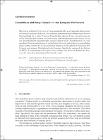Browsing Political Science by Title
Now showing items 5-24 of 67
-
Chieftains delivering : political determinants of capital spending in Ireland 2001-07
(Trinity College (Dublin, Ireland). Department of Political Science, 2010)This is a study about the allocation of resources in Ireland. It asks to what extent capital expenditure is allocated according to geopolitical or to policy considerations. In other words, to what extent do electoral ... -
Citizens Assembly
(2011)We the Citizens set out with optimism, and indeed hope, to test the value to our democracy of including citizens more directly in decision-making. That hope has been truly vindicated. We now have unequivocal proof that ... -
Committees and Party Cohesion in the European Parliament
(2008)How do political parties enforce party discipline and promote cohesiveness in newly emerging legislatures? Political parties in established parliamentary democracies typically exhibit such high levels of unity that the ... -
Comparative military interventions : the question of legitimacy
(Trinity College (Dublin, Ireland). Department of Political Science, 2004)This thesis examines theoretical explanations for why military interventions have taken place in the 'long-decade' following the end of the Cold War. International relations paradigms are evaluated in terms of whether their ... -
Conceptualizing Lotteries
(2007)A number of philosophers and social scientists have investigated the use of lotteries to make various kinds of decisions. These investigations have not, however, produced a rigorous definition of a lottery. This paper ... -
A Conservative revolution:: the electoral response to economic crisis in Ireland
(2014)The 2011 election in Ireland was one of the most dramatic elections in European postwar history in terms of net electoral volatility. In some respects the election overturned the traditional party system. Yet it was a ... -
Cosmopolitanism and Irish foreign policy : a case study analysis
(Trinity College (Dublin, Ireland). Department of Political Science, 2000)This thesis sets out to explore cosmopolitanism as a position within International Relations theory in the context of the activism of Irish Non-governmental Organisations (NGO) in Irish foreign policy. NGOs are posited as ... -
Credible Enforcement before Credible Commitment: Exploring the Importance of Sequencing
(2013)States that are both strong and democratic are the most capable of delivering human development. Existing rational choice accounts of collective action and credible commitment have provided us with the answer as to why ... -
Decision making in the Council of Ministers of the European Union
(Trinity College (Dublin, Ireland). Department of Political Science, 2011)This thesis examines legislative decision making in the European Union with a specific focus upon decision making in the Council of Ministers. It examines the manner in which member states seek to influence the legislative ... -
The divorce referendum 2019
(2020)When Ireland removed the prohibition on divorce from its constitution in 1995 by way of a referendum, the result was achieved with a razor thin margin after a difficult campaign. The circumstances in which the 2019 referendum ... -
Electing the President of the European Commission
(Trinity College Dublin, 1995)This paper is concerned with the legitimacy and accountability of decision-making in the European Union (EU). In the first half of the paper we argue that a straightforward and effective way to improve the legitimacy and ... -
Europeanisation and Polish competition policy
(Trinity College (Dublin, Ireland). Department of Political Science, 2005)In this thesis I analyse the impact of the European Union (EU) on domestic policies in Poland when it was a candidate country for EU membership. The impact of the European Union on domestic policies is called Europeanisation. ... -
Europeanising Healthcare: The Effects of European Integration on Domestic Systems
(Trinity College Dublin. School of Social Sciences & Philosophy. Discipline of Political Science, 2022)Over recent decades, the structure and role of the European Union has developed and evolved. Scholars claim that EU jurisdiction and policy have expanded in many areas, such as agriculture, monetary, and competition policy, ... -
The evolving nature of the Irish policy space
(Palgrave Macmillan, 2021)This chapter uses the Irish element of the Comparative Candidate Survey (CCS) of Dáil candidates in the 2020 election to explore policy similarities and differences between Irish parties. Using previous CCS data, it also ... -
Explaining and predicting the adoption, timing and location of terrorism in civil conflicts
This thesis examines the adoption, timing and location of terrorism in civil conflicts. It analyzes the effect of territorial advances on the timing and location of state-based and one-sided violence, the effect of battlefield ... -
Explaining state participation in environmental treaties
(Trinity College (Dublin, Ireland). Department of Political Science, 2012)This project aims to advance the literature on the dynamics of state participation in environmental treaties. The overarching question is, how do we explain the variance in state signature and ratification of environmental ... -
Explaining the collapse of communism in Poland : how the strategic misperception of Round Table negotiators produced an unanticipated outcome
(Trinity College (Dublin, Ireland). Department of Political Science, 2002)This dissertation set out to discover why the Polish communist party (PUWP) lost power in Poland over the summer of 1989. Given the fact that neither the PUWP nor Solidarity expected the fall of communism at the outset of ...




















